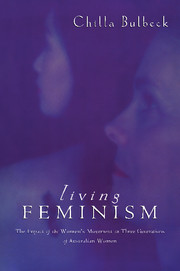Book contents
- Frontmatter
- Contents
- List of Tables
- Preface
- List of Women Who Told their Biographies for the Book
- Abbreviations
- Introduction
- Part One Women's Lives Through A Feminist Lens
- 1 Growing Up As Girls
- 2 Training For Life
- 3 Work
- 4 Marriage and Motherhood
- Part Two Present and Future Feminisms
- Conclusion
- Appendix 1
- Appendix 2
- Notes
- Bibliography
- Index
3 - Work
Published online by Cambridge University Press: 20 May 2010
- Frontmatter
- Contents
- List of Tables
- Preface
- List of Women Who Told their Biographies for the Book
- Abbreviations
- Introduction
- Part One Women's Lives Through A Feminist Lens
- 1 Growing Up As Girls
- 2 Training For Life
- 3 Work
- 4 Marriage and Motherhood
- Part Two Present and Future Feminisms
- Conclusion
- Appendix 1
- Appendix 2
- Notes
- Bibliography
- Index
Summary
Because of commitments to family and home, part-time work is usually required which eliminates promotion and many other benefits for women. As many women in my age group are unskilled or have been out of the work place for many years, low paid or menial work has to be accepted. In my case, I am expected to take care of my family, and husband, much of the housework, grandchildren, and, as our parents age, care for them as well. I am also expected to bring in some sort of income. Leisure time does not exist. Even when watering the garden, I am still performing a task. Should I watch TV, I will probably be ironing or sewing as well.
(Helen)In the 1960s about four-fifths of husbands disapproved of their wives working (Gilding 1991:118). By the 1990s the vast majority of husbands and wives approved both of women's labour force participation and equal sharing of housework in such situations (Bittman and Lovejoy 1993:313), while in a 1987 survey 75 per cent strongly supported equal opportunity legislation for women (Sex Discrimination Commissioner 1992:15). These surveys suggest that it is now widely accepted that women should have equal opportunities at work, supported by equal pay initiatives, equal employment opportunity legislation, childcare, education and retraining. However, while men endorse equal sharing of housework, they do not generally practise it. Working women carry the double load of which Helen complains.
- Type
- Chapter
- Information
- Living FeminismThe Impact of the Women's Movement on Three Generations of Australian Women, pp. 69 - 94Publisher: Cambridge University PressPrint publication year: 1997



